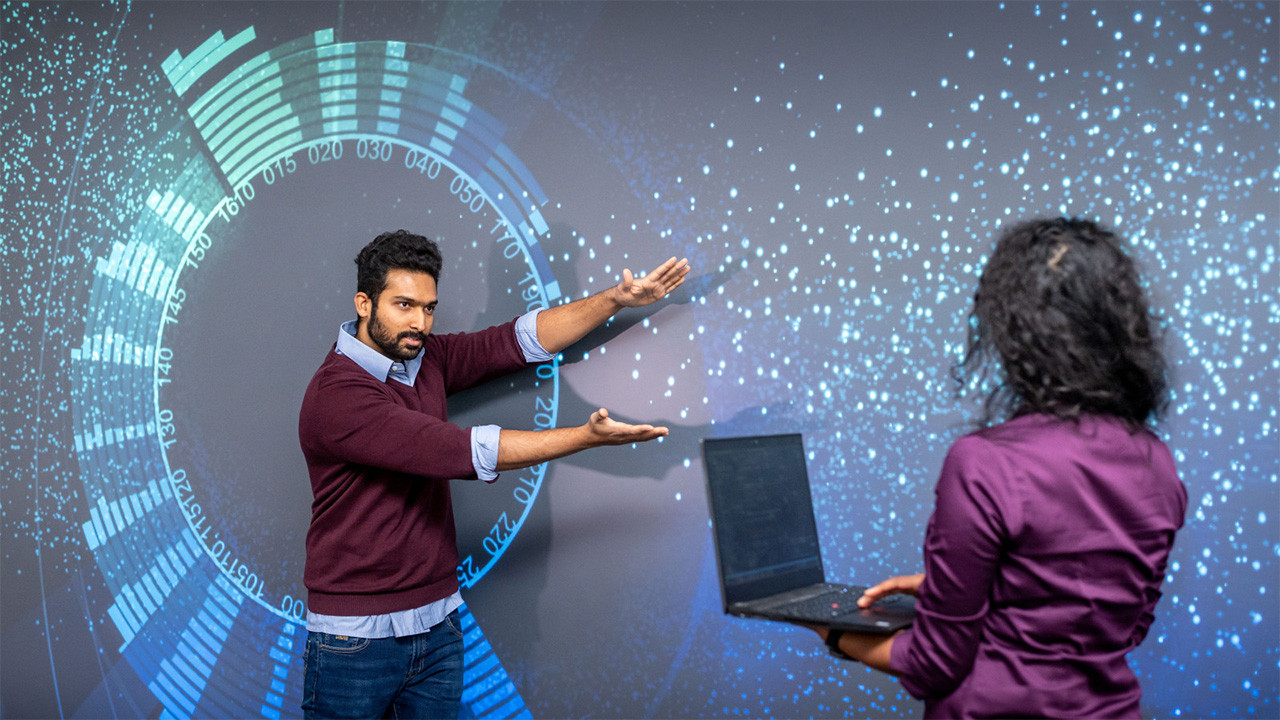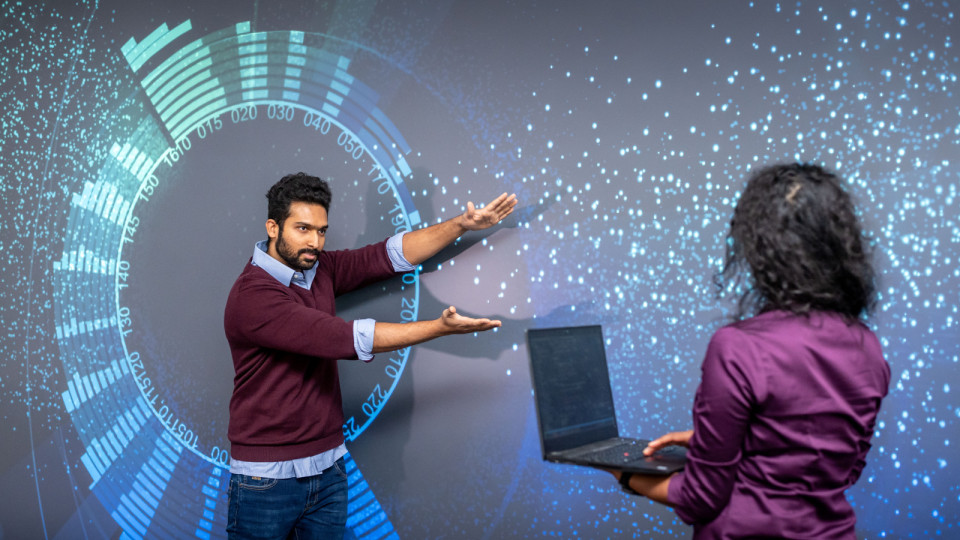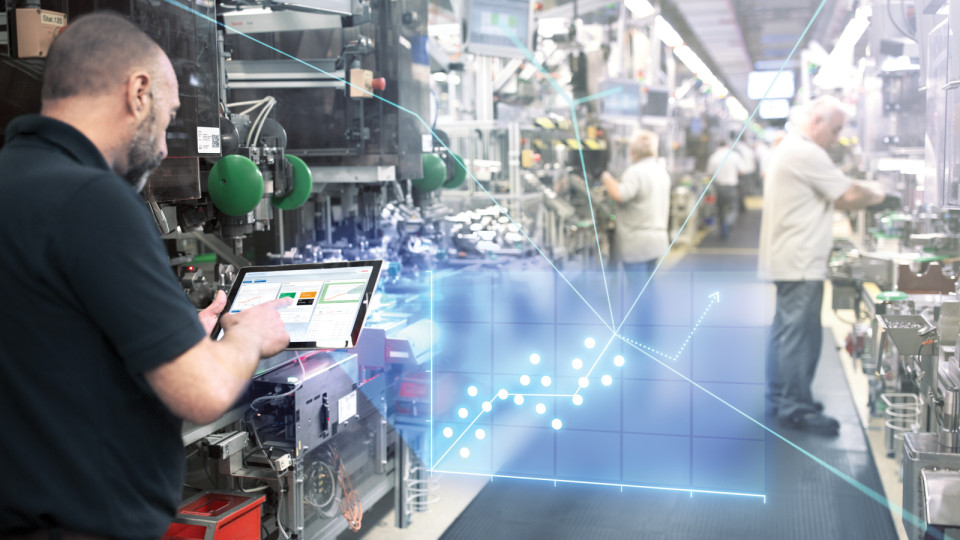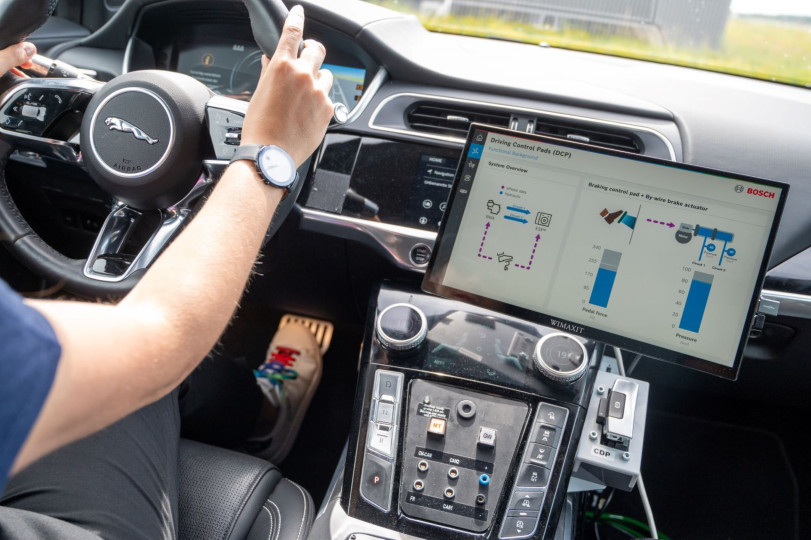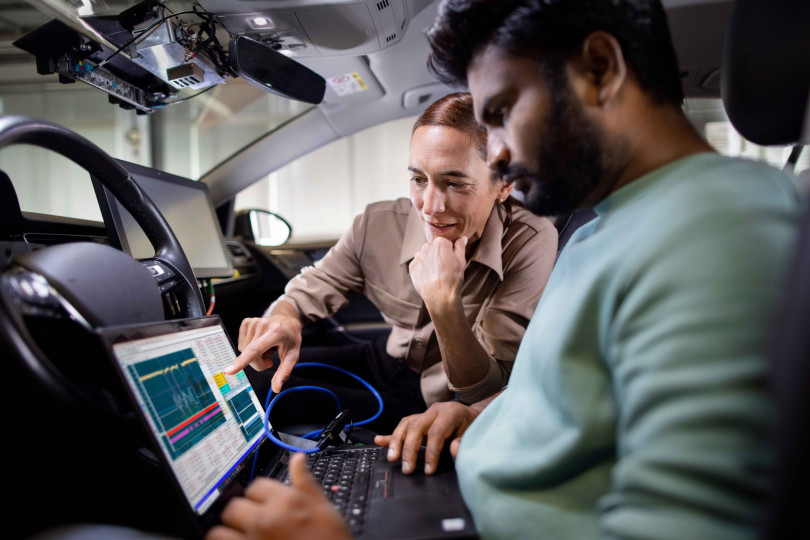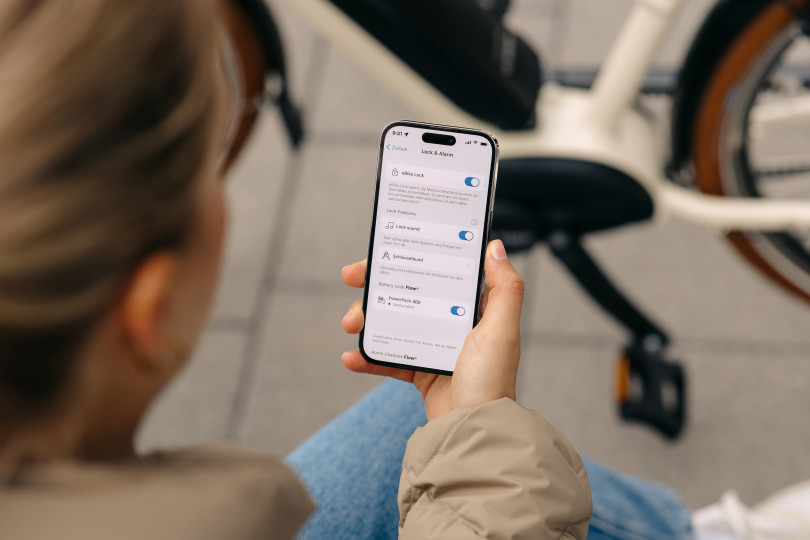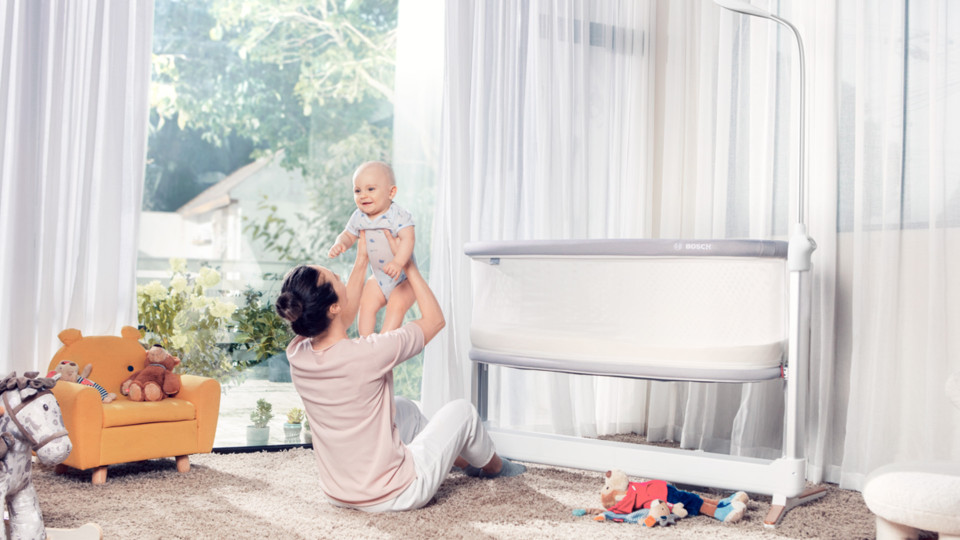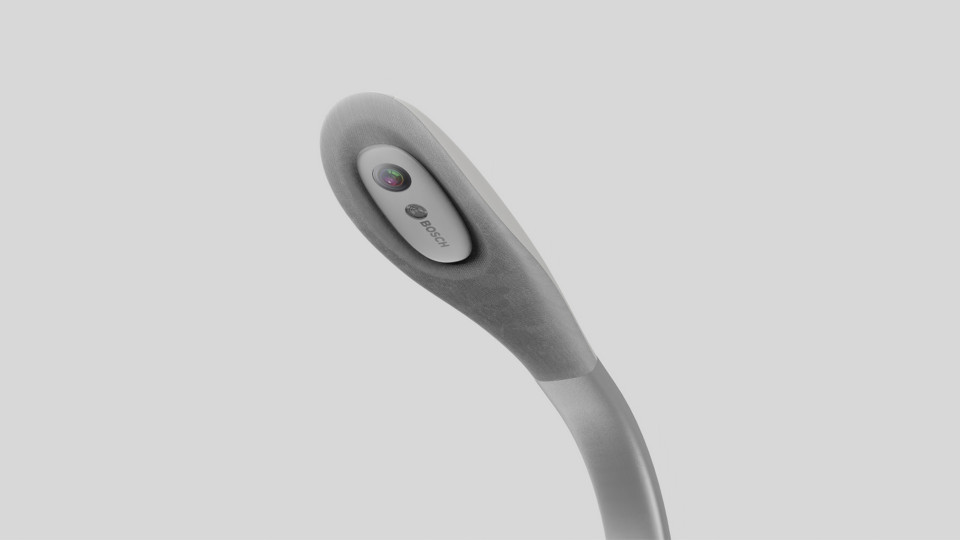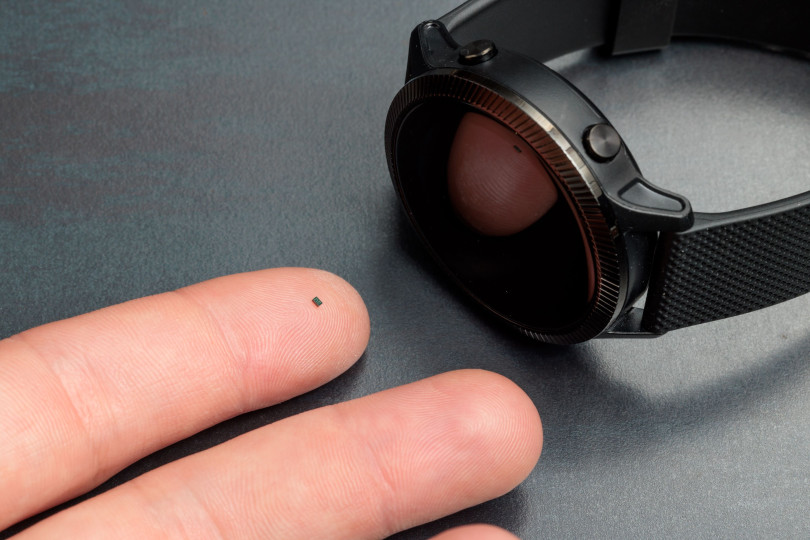Las Vegas, NV, USA – Software and artificial intelligence (AI) are already shaping our present. For the future, however, they will be crucial. Bosch was quick to recognize the opportunities offered by intelligent software and services, and focused on them at an early stage: AI now features in every one of the technology company’s products – or was involved in their production. “Intelligent software and digital services have become cornerstones of our core business,” says Tanja Rueckert, member of the board of management of Robert Bosch GmbH, at the CES 2025 electronics trade fair in Las Vegas, Nevada. And the AI and software business is continuing to gain speed: Bosch expects to achieve sales of software and services of over 6 billion euros by the beginning of the next decade. The Mobility business sector will generate around two-thirds of this sales revenue.
AI is playing a particularly significant role in this development. “With over 1,500 patents in just five years, Bosch leads the way in Germany and Europe,” Rueckert says. Almost 5,000 Bosch AI specialists are now working on intelligent solutions. Bosch is offering tailored courses to consistently drive forward the training of its entire workforce in the field of AI. To date, the company’s own AI Academy has trained more than 65,000 associates. This also dovetails with the results of the latest Bosch Tech Compass, an annual survey of people’s expectations of new technologies. According to the survey, four out of five of those surveyed worldwide are planning AI-related further training this year. And two-thirds believe that schools should teach AI as an independent subject. The message is clear: AI skills are fundamental to the future of the working environment.
At CES 2025 in Las Vegas, Bosch is presenting products and solutions that are already making people’s lives safer, more efficient, and more convenient thanks to software and AI. Or to put it another way: with software and AI, Bosch is improving the everyday lives of people from all walks of life.
Mobility, the home, health – Bosch software in all life situations
Take roads, for example: Bosch has long seen itself as a company providing software for mobility. It recently programmed a new function for vehicles that allows cars to brake smoothly and without jerking. This is a boon for drivers in slow-moving traffic, as well as for passengers with motion sickness. “No one understands the requirements and needs of the automotive industry as comprehensively as Bosch,” says Paul Thomas, president of Bosch in North America, at CES 2025. “With our mobility-specific software expertise, we’re the ideal partner for the world’s major tech players.” After all, software will change not only how we use and experience cars, but how we develop them as well. In the age of software-defined mobility, Bosch programmers approach cars from a software perspective. They are developing technologies and solutions for new centralized architectures that effortlessly manage all interactions between automotive electronics and the cloud. This will be essential in the future if cars are to be able to download new functions for areas such as infotainment or driver assistance easily and conveniently over the air.
At Bosch, AI has been playing an important role in assisted and automated driving for years now. For example, the MPC3 multifunctional camera has been in volume production since 2019 and is setting new standards. This camera is able to reliably recognize objects and people as well as to distinguish between the road and the edge of the road, thereby keeping the car safely in its lane. The camera combines conventional image-processing algorithms with AI methods for a complete understanding of what it is recording. “Our AI-based multifunction camera not only makes driving more relaxed, but also makes the roads safer for all users,” Thomas says. To achieve this, Bosch is combining its profound automotive engineering knowledge and its AI expertise with a vast pool of in-house sensor data. “We’re using AI to increase the efficiency of our assistance systems,” Thomas says.
What’s more, Bosch is investigating how generative AI can be used to further improve automated driving functions. The expectation is that it will enable vehicles to assess situations and react accordingly, and in this way keep road users even safer. In the future, generative AI will train automated driving functions more quickly, thus reducing the number of test miles required to validate them. And by adding conditions such as snow to the road, generative AI will quickly be in a position to alter the context of a driving sequence recorded by cameras or radar sensors. In other words, systems can be trained for snow without having to wait until snow actually falls – the AI will do it itself.
AI to combat worries about range and new theft protection for eBikes
By merging the physical and digital worlds, software also enhances the e-bike experience. Bosch is debuting its new Battery Lock theft protection system in Las Vegas. This provides additional protection for the e-bike battery: locking it digitally by using the rider’s smartphone as a key. AI also helps allay worries about range: with the AI-based Range Control feature, e-bike riders who are about to set out on a journey can determine the battery charge level with which they would like to arrive at their destination. And in the kitchen as well, people also have their own personal preferences. The intelligent Bosch Series 8 oven will also be on show at CES 2025. It is equipped with sensors, cameras, and AI. With their help, the oven can recognize around 80 dishes and automatically set the optimum cooking method and temperature. And for many dishes, even the degree of browning can be individually selected.
Intelligent Bosch crib – a helping hand for child carers
Sensors, cameras, and AI can also give parents a helping hand when caring for newborn babies. The new, intelligent Bosch Revol crib can monitor a baby’s vital signs such as heart rate and respiratory rate. The software also signals in good time if a soft toy or blanket is covering the child’s airway or if crying is detected. And should the baby have trouble falling asleep, the crib can automatically engage a gentle rocking function. Users can decide for themselves whether the data the crib records is ultimately stored in encrypted form on Bosch servers or remains offline within their own four walls. The CTA, organizer of CES 2025, has designated the intelligent Bosch crib a CES Innovation Award Honoree.
Smart Bosch sensors have become an integral part of our daily lives
Another example of how the rapid acceleration of AI-based innovations is changing the way people use new technologies is smart sensors. These tiny components have a big impact. Microelectromechanical sensors (MEMS), packed with Bosch software and AI, can be found in all areas of our daily lives: whether smartphones, e-bikes, fitness trackers, or cars. What do they do? They can tilt displays from vertical to horizontal, count steps, and control airbags. Modern MEMS sensors even have an integrated microprocessor and run with independent software.
Without these sensors, everyday functions that we have all become accustomed to wouldn’t be possible at all – functions such as “waking up” a smartphone display or activating a voice assistant with wireless headphones. Smart sensors record data such as acceleration, rotation, and temperature and use Bosch software to process it directly in the integrated microprocessor. This means their entire functionality is contained in a compact housing – Bosch produces the world’s smallest sensor, which measures just 0.8 x 1.2 millimeters, making it barely larger than a grain of sand. Another advantage is that sensors with an integrated microprocessor draw noticeably less power from the battery of a smartphone or smartwatch. For the “wake-up” function, for example, the sensor system needs only its own microprocessor. Since it can do without the device’s central computer, this prolongs the battery’s runtime.
Bosch grows with billions of units in the sensor market
AI takes smart MEMS sensors to the next level: Bosch offers sensors with integrated self-learning AI software, for devices such as fitness trackers. The AI recognizes a variety of different movements and learns every repetitive fitness activity. If required, it can also provide users with qualitative feedback about how well they have done their exercises. The AI runs on the sensor itself; no connection to a cloud or smart device is needed. All data remains private and activities can be continuously recorded and analyzed without an internet connection.
According to the market research institute Yole Group*, this is now the fourth year in a row that Bosch is the market leader in the MEMS sector. More than one in every two new smartphones worldwide is equipped with Bosch sensors. And the potential is still huge: according to the Yole study, the annual global demand for MEMS in the automotive and consumer electronics sectors alone is expected to grow from today’s 33 billion to over 40 billion units by 2029. Bosch wants to share in this growth and is planning to produce ten billion smart MEMS sensors with integrated microprocessors and independent software for consumer electronics by the end of 2030.
*Source: Status of the MEMS Industry 2024, Yole Intelligence
Contact person for press inquiries:
Athanassios Kaliudis
Phone: +49 711 811-7497
Bosch at CES 2025:
PRESS CONFERENCE: Monday, Jan. 6, from 9:00 to 9:45 a.m. PT
with Dr. Tanja Rückert, member of the board of management of Robert Bosch GmbH, and Paul Thomas, president of Bosch in North America, in Ballroom Banyan ABCD, Mandalay Bay Hotel, Las Vegas, South Convention Center, Level 3, as well as livestreamed on the Bosch Media Service.
BOOTH: Jan. 7 – 10, in the Central Hall, booth #16203.
PANELS WITH BOSCH EXPERTS:
“What’s Next in Vehicle Tech”,
Jan. 9, 11 a.m. PT, Las Vegas Convention Center West / W219, session with Fedra Ribeiro, executive vice president sales Cross-Domain Computing Solutions at Bosch.
“Predictive AI: Transforming Customer Service and Business”,
Jan. 9, 3 p.m. PT, Las Vegas Convention Center North / N261, session with Davie Sweis, chief digital officer at the Global Business Services at Bosch.
“Trends in Electric Car Consumption: Who, What, Where”
Jan. 9, 2 p.m. PT, Las Vegas Convention Center West / L2 W219, session with Sabrina Rathgeber, director Global Battery Business at Bosch.
WEST HALL MOBILITY STAGE:
“Software defined reality: Achieving consumer expectations for software-defined vehicle”
Jan. 7, 11:20-11:50 p.m. PT, session with Thomas Irawan, president of ETAS GmbH, and Stefan Buerkle, regional president Cross-Domain Computing Solutions Americas.
“Enabling electrification options for consumers as the market shifts”
Jan. 8, 9:40-10:10 a.m. PT, session with Peter Tadros, regional president Power Solutions, and Kevin O’Keefe, regional president Electrified Motion at Bosch.
“Intelligent production and automation transform battery manufacturing”
Jan. 9, 9:40-10:10 a.m. PT, session with Sabrina Rathgeber, director Global Battery Business at Bosch.
Contact persons for press inquiries:
Bosch at CES: Irina Ananyeva, +49 152 597-53284, Tim Wieland, +1 248 410-0288, Trix Böhne +49 173 523-9774
Mobility, software: Athanassios Kaliudis, +49 152 086-51292
Artificial intelligence: Matthias Jekosch, +49 711 811-17645
Connected manufacturing: Manuela Kaiser, +49 711 811-44203
Mónika Hack
+36 70 510 5516
The Bosch Group is a leading global supplier of technology and services. It employs roughly 429,000 associates worldwide (as of December 31, 2023). The company generated sales of 91.6 billion euros in 2023. Its operations are divided into four business sectors: Mobility, Industrial Technology, Consumer Goods, and Energy and Building Technology. With its business activities, the company aims to use technology to help shape universal trends such as automation, electrification, digitalization, connectivity, and an orientation to sustainability. In this context, Bosch’s broad diversification across regions and industries strengthens its innovativeness and robustness. Bosch uses its proven expertise in sensor technology, software, and services to offer customers cross-domain solutions from a single source. It also applies its expertise in connectivity and artificial intelligence in order to develop and manufacture user-friendly, sustainable products. With technology that is “Invented for life,” Bosch wants to help improve quality of life and conserve natural resources. The Bosch Group comprises Robert Bosch GmbH and its roughly 470 subsidiary and regional companies in over 60 countries. Including sales and service partners, Bosch’s global manufacturing, engineering, and sales network covers nearly every country in the world. Bosch’s innovative strength is key to the company’s further development. At 136 locations across the globe, Bosch employs some 90,000 associates in research and development, of which nearly 48,000 are software engineers.
The company was set up in Stuttgart in 1886 by Robert Bosch (1861–1942) as “Workshop for Precision Mechanics and Electrical Engineering.” The special ownership structure of Robert Bosch GmbH guarantees the entrepreneurial freedom of the Bosch Group, making it possible for the company to plan over the long term and to undertake significant upfront investments in the safeguarding of its future. Ninety-four percent of the share capital of Robert Bosch GmbH is held by Robert Bosch Stiftung GmbH, a charitable foundation. The remaining shares are held by Robert Bosch GmbH and by a corporation owned by the Bosch family. The majority of voting rights are held by Robert Bosch Industrietreuhand KG. It is entrusted with the task of safeguarding the company’s long-term existence and in particular its financial independence – in line with the mission handed down in the will of the company’s founder, Robert Bosch.
Additional information is available online at www.bosch.hu, iot.boschblog.hu, www.bosch.com, www.iot.bosch.com, www.bosch-press.com, www.twitter.com/BoschPresse

